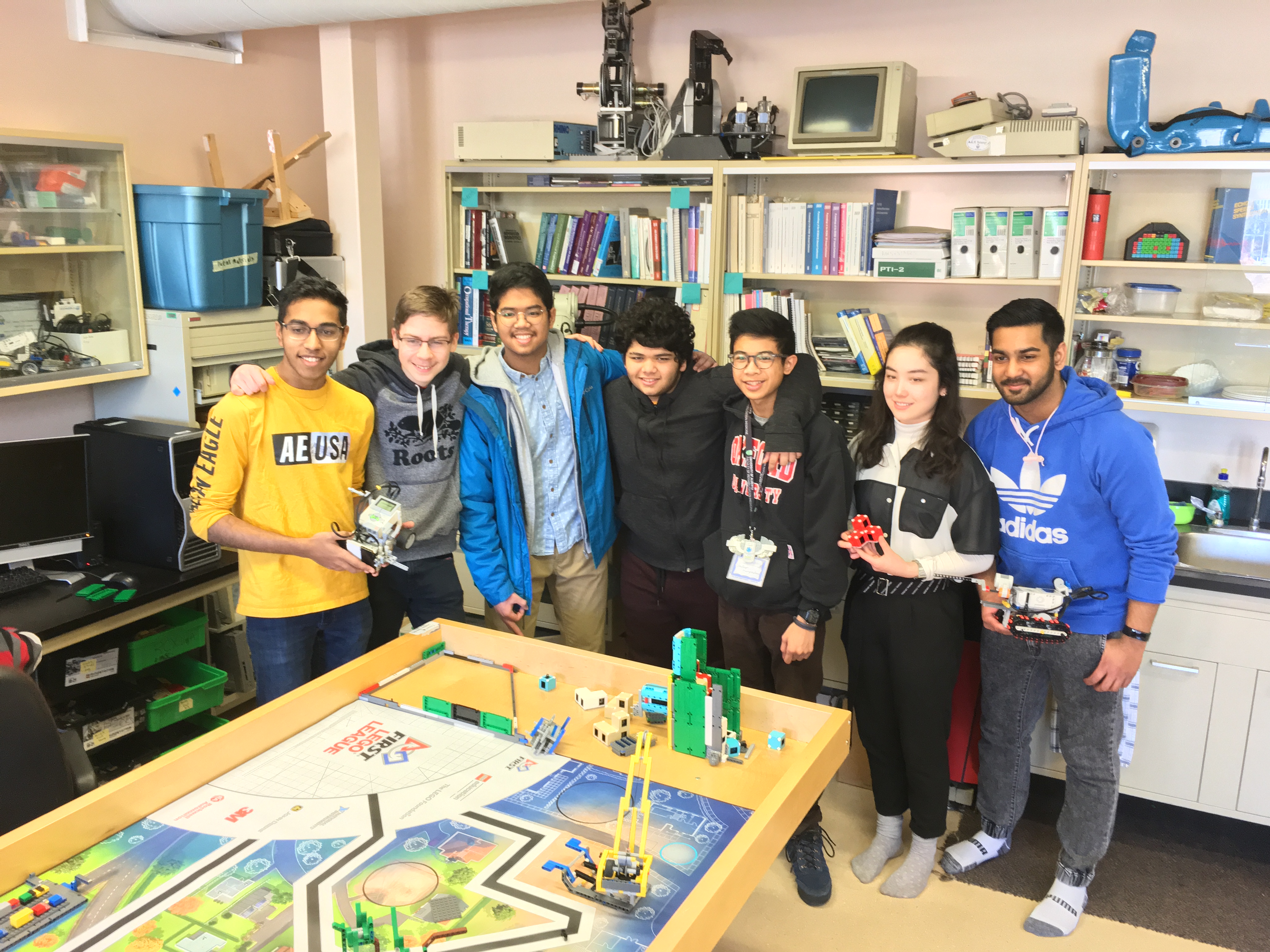
Under the direction of Kim Adams, associate professor in the Faculty of Rehabilitation Medicine, two faculty-sponsored teams of nine to 14 year-old kids competed again this year in the FIRST® LEGO® League, a global LEGO robotics competition. Harsh Beesoon (far right) began as a participant and returned as a junior mentor, inspiring other participants to do the same.
"For the past few months, volunteering as a mentor for the FIRST® LEGO® League has consistently been the highlight of my week," said Harsh Beesoon, junior mentor for the University of Alberta's Faculty of Rehabilitation Medicine-sponsored teams.
FIRST® LEGO® League (FLL) is a global LEGO robotics competition that challenges young people and their mentors to come up with ways to build a better future. The program is built around theme-based challenges to engage children ages nine to 14 in research, problem solving, coding and engineering.
This year, the faculty sponsored two teams of children to compete. They might not have won the regional tournament on February 1 at NAIT, but they celebrated another successful year of fun and STEM learning.
Kim Adams, associate professor in the Faculty of Rehabilitation Medicine, has organized and coached FLL teams since 2012. With a background in electrical engineering and rehabilitation science, Adams' research focuses on assistive robots for children with physical disabilities to engage in play and learning activities. She opens up her Assistive Technology Lab at Corbett Hall for the teams to meet and work each week, and she and some of her graduate students provide guidance and expertise to the kids.
"This year we didn't win any awards at the competition, but it was fun. Everything came together and the kids did really well with their robot programs, presentations and team work," said Adams.
Q & A with Harsh Beesoon, junior mentor Rehabilitation Medicine-sponsored FIRST® LEGO® League teams
For Beesoon, being involved in the program led him to discover a passion for LEGO, robots and computer programming as well as mentorship. He started out as a participant and returned as a mentor for the next round of teams once he aged out of the program. I spoke to him about what the FLL means to him and why he returned to the program as a junior mentor after first being involved as a participant.
How did you get involved in the Faculty of Rehabilitation Medicine's FIRST® LEGO® League (FLL) team?
I first got involved in 2012 when my older sister, who was a mentor for the program, insisted that I come and be a part of the team, although I was not too keen at the time. After having experienced it for a couple of hours, I knew that that was where I belonged and looked forward to going back every week.
How many years have you been involved?
I have been involved for eight years now. I was a participant from 2012-2016, and from 2017 up to now, I have been coming back as one of the mentors.
What made you want to come back as a junior mentor?
I have been mentoring for three years now. I like coming back to mentor because not only does it give me a sense of fulfillment, but I enjoy teaching and spending time with the kids. They can be handful, but I have learned a lot from them and they are very fun.
How did it feel to win the mentor award last year?
Winning the best mentor award meant a lot to me because I knew it was the kids that nominated me and convinced the judges at the competition to award it to me. Winning the physical award did not mean as much to me compared to knowing that I had a positive influence on the kids and that they cared that much.
What have you learned being part of FLL, as a participant and then as a mentor?
I think that the most important thing that I have learned as a participant is that people grow in a multitude of ways. I did not have any idea how much I would be into robotics and building until I joined my first year. I also learned how to work as a team and as a leader. In my final year as a participant, I became a leader and helped everyone on my team as best as I could and helped them to learn new things.
As a mentor, I learned that it is very important to continue learning. While mentoring the young kids, I developed a lot of patience and simply put, learned to keep my cool. However, the most important thing I learned as a mentor was that the happiness of the kids was the most important thing. I always did my best to make sure all the kids were happy and having fun, and my heart sank when I'd see anyone of them upset in any way.
What are your plans for the future?
I am 18 years old right now, and I'm hoping to get accepted into the U of A to do a Bachelors in Education to become a high school social studies/history teacher or possibly an elementary school teacher. Either way, I hope that in the future I can continue to teach and coach an FLL robotics team.
---
For the young people like Harsh who are passionate about FLL and want to continue participating after they age out, the group is currently fundraising to start a team for the next age group (14 to 18), called FIRST Tech Challenge. Contact Kim Adams if you'd like more information.